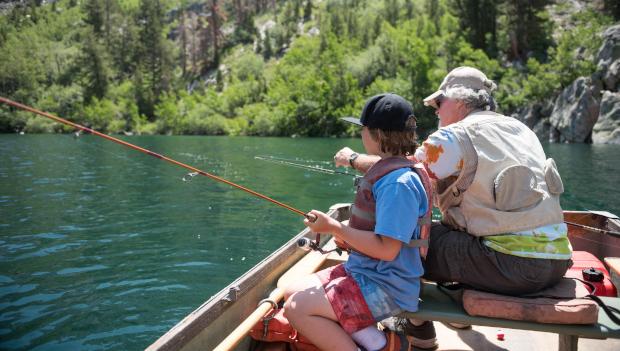
Brush up on a few essential fishing tips and preparation for this spring’s fishing trips. There is always more to learn and even more to be reminded of before you set off. State parks offer many opportunities for fun fishing and camping trips. You can “spring into fishing” this year and ReserveAmerica has made it easier with these useful tips on tackle preparation and more.
Do Your Homework
Prepare for your fishing trip by doing your homework. Research your destination. ReserveAmerica offers great information on fishing destinations. Calling a local bait shop can be extremely informative. You can ask about the best lures, best places to get a bite, and water clarity. You can also ask any knowledgeable bait shop about the lay of the land, such as landmarks, ledges, channel bends, and rock outcroppings. Knowing where fish may congregate may enhance your chances for a catch!
Things You’ll Need to Start
For those new to fishing camping trips, it is good to list things that will be needed prior to taking off for your choice location.
- Clothing – the proper clothing will make the trip more comfortable and enjoyable. Don’t forget essentials such as extra pairs of socks, a vest with multiple pockets, waders for getting out in the water, pants, waterproof clothing, and a windbreaker. Also remember to bring a protective case for your cell phone.
- Protection from the elements – A hat, sunscreen, and lip balm are essentials.
- Fishing license – Naturally you’ll need to find out if you will need a fishing license. If you’re going to a state park, some do not require licenses, while others do. Those under the age of 16 may not need a license, so check out your local rules and be prepared.
- Rod and Reel – Your equipment will consist of a rod and reel as well as line. It’s also helpful to pack extra line with you in case of tangles or breakage.
- Bait and Lures – And of course, you’ll need bait or lures. (See below)
- Hooks and sinkers – These will be standard gear as you’ll need to keep your hooks down underwater.
- Knife, scissors or nippers – for cutting line
- Swivels – Swivels prevent your line from twisting and some have a snap on one end which helps you change baits easily. When using live bait, you’ll need some bobbers. And lastly, needle nose pliers will be needed to help you get the hook out of the mouth of your catch.
Recommended: Plan a Fresh Water Fishing Adventure This Summer
Get the Proper Lures and Baits
- Live bait is an excellent way to begin. Minnows, worms, crayfish, and wax worms are a good start, then you can try others such as leeches or frogs.
- You will then want to try hardbaits, such as lipless cranks, topwaters, and crankbaits, which fish love.
- Inline spinners are an option. They mimic a baitfish and fish tend to go for them.
- For a well-rounded box of tackle, have a good jig head selection.
- For bass fishing, specialized lures include spinnerbaits, jigs, crankbaits, topwaters, and soft plastics.
We recommend checking with a local fishing shop for advice, as each location, and the fish in them are different. Turning over rocks and looking around the local environment may provide additional sources of bait as well.
Recommended: 9 Places for Trout Fishing this Spring
Tackle Preparation
It is vital to ensure all your equipment is in tiptop shape for your next fishing trip. Replace worn-out line and look for nicks or any weak areas on your line. You don’t want it breaking on you at an inopportune time. Please make sure to dispose of used line properly.
Make sure to change your hooks. You’ll need to watch for hooks that are rusting and will break off. Change your hooks frequently and you won’t have that problem. They can start off sharp but get dull with many uses, and new hooks are cheap and easy to replace.
Your reel should be clean and kept oiled. The rod shouldn’t have any cracks or nicks. You’ll want all your gear to work perfectly so you don’t lose any fish.
Organizing Your Gear
Organizing your gear is a key point to having anything you need easy to access when you need it. First and most important is to have a first aid kit handy just in case you are injured. Hooks can pierce the fingers now and then. Also take along drinks, and snacks. You’ll likely want a storage system for lures, weight, hooks, and other accessories. With a large tackle box that will accommodate all your lures and other items, you can just reach for what you need when you need it.
Fishing camping trips are fun for the whole family. Kids can learn to fish early and it will be an activity to share with parents and friends all their lives. Be familiar with the regulations of the area where you are headed, and then just have fun. Hopefully you’ll be able to make a trophy catch which you can brag about for years to come.